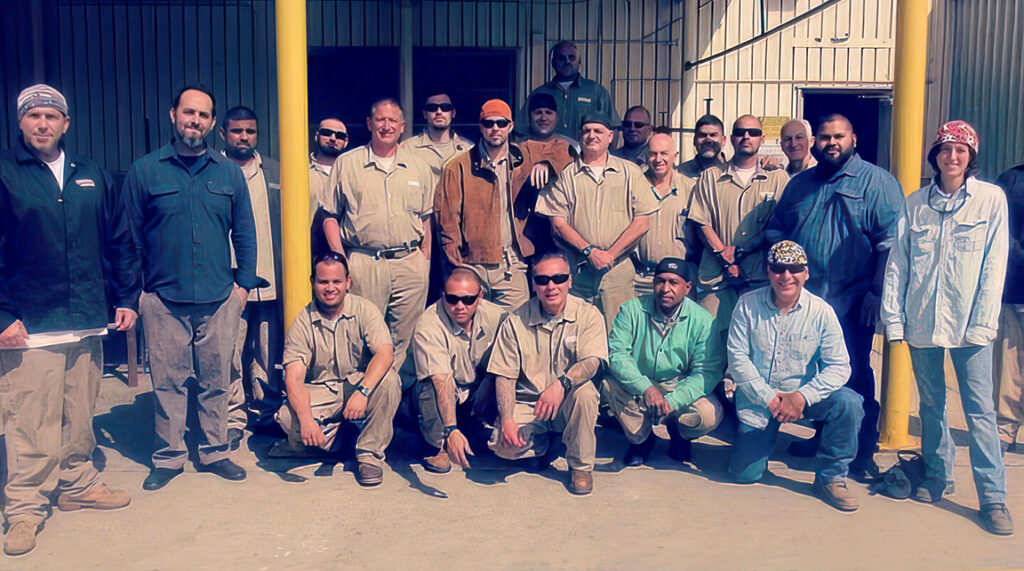Erik Langarica’s title is “welding instructor,” an accurate description, but one that does not tell the whole story of the impact his trade and instruction brings to his students and to society. For six years, Erik, who is a contract instructor with El Camino College, has been teaching welding to inmates at the Federal Correctional Institution Terminal Island in San Pedro, California—a low-security institution managed by the Bureau of Prisons (BOP).
The classes Erik teaches provide inmates with fundamental to advanced welding skills. The curriculum he uses is provided by Hobart Institute of Welding Technology, which is accredited by the Accrediting Commission of Career Schools and Colleges and by the American Welding Society. Upon completing the training, inmates can attain various welding process certifications.
Erik’s students come from all walks of life and backgrounds. Some are highly educated, and some have little to no education. Yet they all have a common goal: to gain the skills that will enable them to make a living wage upon release, whether that is by being hired by an employer or becoming an entrepreneur.
Erik’s classes play a key role in the mission of the BOP, which is to “provide a myriad of inmate programs to address criminogenic needs such as those related to substance abuse, education, employment and more, thereby ensuring inmates’ successful transition to the community.”
Finding employment that pays a living wage is key to helping paroled offenders attain financial stability, create opportunities for personal and professional growth, enhance social integration, and develop a sense of purpose, all of which are essential in reducing recidivism rates.
Why employment is considered the number one reason parolees’ successfully reintegrate into society:
- Stable Income: Employment provides a source of stable income for individuals upon release from incarceration. This financial stability can help meet basic needs such as housing, food and transportation, reducing the likelihood of engaging in criminal activities to survive.
- Structured Routine: Employment offers structure and routine to individuals’ lives, which can be particularly important for those transitioning from a highly regimented prison environment to society. A regular schedule can help them stay focused and avoid falling back into old habits.
- Sense of Purpose: Having a job gives individuals a sense of purpose and belonging, which can be lacking for many former inmates. Feeling valued and productive can boost self-esteem and reduce the likelihood of engaging in criminal behavior.
- Community Integration: Employment facilitates community integration by providing opportunities for individuals to interact with coworkers, supervisors and customers. These social connections can help build a support network and reduce feelings of isolation or alienation.
Erik’s classes provide approximately 210 hours of training, which takes from three to five months to complete. He teaches one morning and one afternoon session, each consisting of 25 students. At the completion of training, each student is tested individually on a pass/fail basis.
If they pass the test, they receive a standard certification depending on the type of welding they were taught. Erik estimates from anecdotal feedback that anywhere from 60% to 80% of his students who successfully complete the training end up getting a job in welding or in a welding-related field. The rate of pay for those jobs can range from $25 an hour to $80 an hour, depending on the state where the former inmate ends up working and the type of welding they perform.

Erik (Pointing) with his welding class graduates.
Providing a Second Chance
Erik states that the high employment rate for his students is partially due to the industry’s success with hiring former offenders. In fact, Erik feels that many employers prefer to hire his students versus someone off the streets because they find that his students are more dedicated; they know this is their chance to change their lives, and they don’t want to mess it up. For this reason, they are often found to be excellent employees. Erik emphasizes that “employers know that for many of these individuals, this job is their meal ticket. They don’t want to go back to doing what got them in trouble. They are determined to make it work. I would say that nine times out of 10, these individuals turn out to be some of the best employees out there.”
El Camino College’s Commitment to Providing Training That Helps Rehabilitate Inmates
For more than 15 years, El Camino College has been working with local, state and federal correctional facilities to provide training programs that offer inmates a pathway to rehabilitation and successful reintegration into society. Jose Anaya, dean of community advancement, El Camino College, states, “Our college has a passion to support the rehabilitation of incarcerated individuals. We feel that these programs provide them with practical, in-demand skills that greatly improves their chances of becoming productive, contributing members of their communities.” Other training programs El Camino has provided to inmates includes solar panel installation, entrepreneurship, and resume writing and interviewing skills workshops.
Training That Transforms Lives
Many inmates in state or federal prisons come from poverty-stricken environments where mentoring, support and guidance were nonexistent. Many were left to fend for themselves on the streets, where the only teachers were hustlers, criminals and drug dealers. Many never learned basic life skills. Yet as Erik will tell you, his students have undiscovered aptitudes and talents. He states, “My students often don’t know that they have certain types of abilities. Many were unaware that they possessed specific gifts and skills that could be developed and used to make an honest living. It is amazing to see them become inspired at the prospect of building something or creating a product, to see something in them ignite and catch fire about furthering their education and getting on the path to a new start and a productive future.”
About the Business Training Center at El Camino College
El Camino College Business Training Center’s (BTC) mission is to help regional employers remain successful, competitive and prosperous in today’s global economy. It realizes this mission by providing employee training programs that help enhance productivity, increase employee engagement, and improve profitability of small and large businesses. The BTC specializes in providing training programs for myriad types of organizations including aerospace manufacturers, space exploration, transportation and logistics, information technology, and media and entertainment companies. Areas of specialized training include cybersecurity, continuous improvement, leadership development, supply chain management (APICS) and workplace skills. To see a complete list of course offerings, view our latest catalog of business training courses.
For more information about the customized employee training program provided by El Camino College, please contact:
Eldon R. Davidson
Director, Center for Customized Training
El Camino College – Business Training Center
13430 Hawthorne Blvd.
Hawthorne, CA 90250
Email: edavidson@elcamino.edu

